Austrian Chancellor estimates substantial financial sum for restoration efforts
Regarding Austria's flood damage, Chancellor Karl Nehammer initially set aside 300 million euros. This money from the disaster fund could potentially be boosted, as suggested by the Austrian chancellor. Individuals who suffered property loss due to the natural disaster can also apply for financial aid from this fund. The extent of the damage caused by the extended period of heavy rainfall in eastern Austria remains unclear.
16:08: Dam Rupture: Residents Warned to Evacuate ImmediatelyIn Paczkow, a town in southwestern Poland, the mayor announced the immediate evacuation of lower-lying districts due to a dam breach in a reservoir. Artur Rolka, the mayor, warned that the situation might worsen further in a social media post. He urged residents who required evacuation to come forward and asked those whose homes and apartments were yet to be affected to leave and relocate to secure locations within the city. The mandatory evacuation followed after a voluntary request went unheeded, as reported on Polish television. The affected reservoir is situated above Paczkow on the Glatzer Neiße, a tributary of the Oder.
15:54: Habeck Urges Greater Climate Protection EffortsVice Chancellor Robert Habeck emphasized the necessity of increased commitment in climate protection after witnessing the flood disaster in various European countries. He emphasized the need for rapid expansion of renewables, energy transition, and climate-friendly industrial production, as reported by the Funke media group. Habeck deems frequent flooding and disasters like the one in Ahr Valley as this year's Bavaria to be consequences of the climate crisis. Therefore, Habeck underscores the significance of our efforts to combat the climate crisis. Although extreme weather events cannot be prevented at this juncture, preventive measures are equally important. Strong dikes, retention systems, and additional space for rivers are required to better protect people.
15:36: Rise in Flood Death TollThe death toll due to flooding in several European countries has risen to at least 15. Austria (three deaths), the Czech Republic (one death), Poland (five deaths), and Romania (six deaths) are particularly affected.
15:21: Poland Declares State of Emergency for Flood-Hit RegionsPoland has declared a state of emergency in flood-affected areas. The Polish government passed an emergency ordinance in a meeting. This state of emergency is valid for 30 days in parts of Lower Silesia, Silesia, and Opole voivodeships. It grants authorities additional powers to issue orders, as certain civil liberties and rights are temporarily restricted. This enables authorities to more easily order the evacuation of specific locations, areas, or facilities. They can also prohibit citizens from being in certain locations.
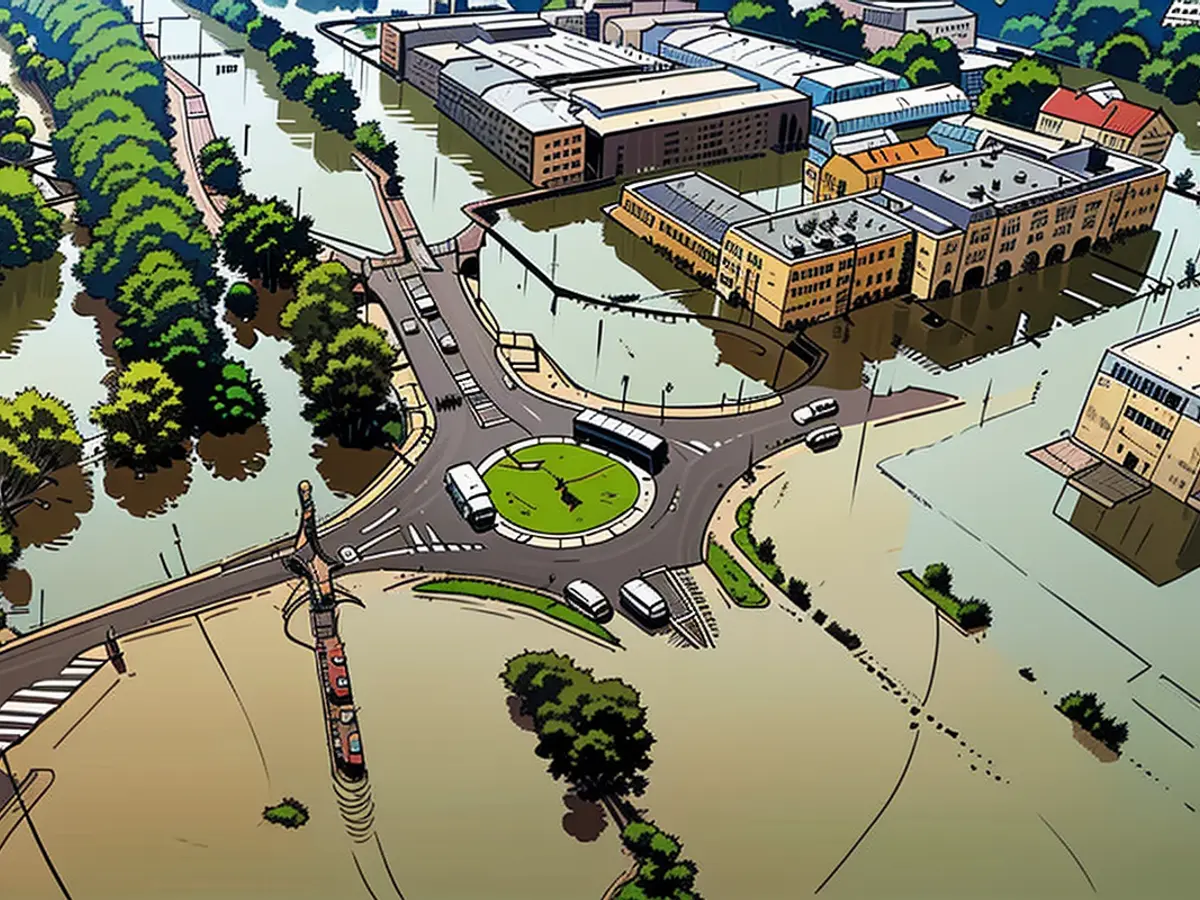
14:59: "More Frequent and Intense": Expert Explains Causes of Extreme RainThe severe floods in Austria, Poland, Czech Republic, and Romania have left behind distressing scenes. However, why are extreme rain events and flooding risk becoming more frequent? ntv asks water expert Georg Johann.
14:34: Austrian Federal Railways Extend Travel Advisory until ThursdayDue to the ongoing extreme weather conditions in a significant portion of Austria, Austrian Federal Railways (ÖBB) have extended the travel advisory issued on September 13, 2024, until September 19, 2024. ÖBB urges all passengers to postpone any unnecessary travel during this period to a later date. Already booked tickets remain valid until September 22.
14:19: Rise in Death Toll from Flooding in Europe to 11The death toll due to flooding in parts of Austria, Poland, Romania, and the Czech Republic has risen to at least 11. Two more individuals have died in Austria, as per police reports. In the Czech Republic, one person drowned in the Krasovka river in the eastern region of Moravia-Silesia, according to police president Martin Vondrasek on public radio. So far, eight deaths had been reported in the four countries. Czech authorities also report at least seven missing persons.
14:04: German Government Offers Aid to Flood-Affected EuropeansThe German government is providing support to individuals affected by floods in various European countries. German deputy government spokeswoman Christiane Hoffmann stated that people in neighboring countries, European partners, and Germans should realize that they are closely monitoring the situation and are ready to extend their assistance. The devastation in Austria, Czech Republic, Poland, and Romania is often catastrophic. Hoffmann added, "We are horrified by the images and are shocked by the news of deaths and missing persons. In the name of the German government, I extend our condolences and sympathy to all those affected."
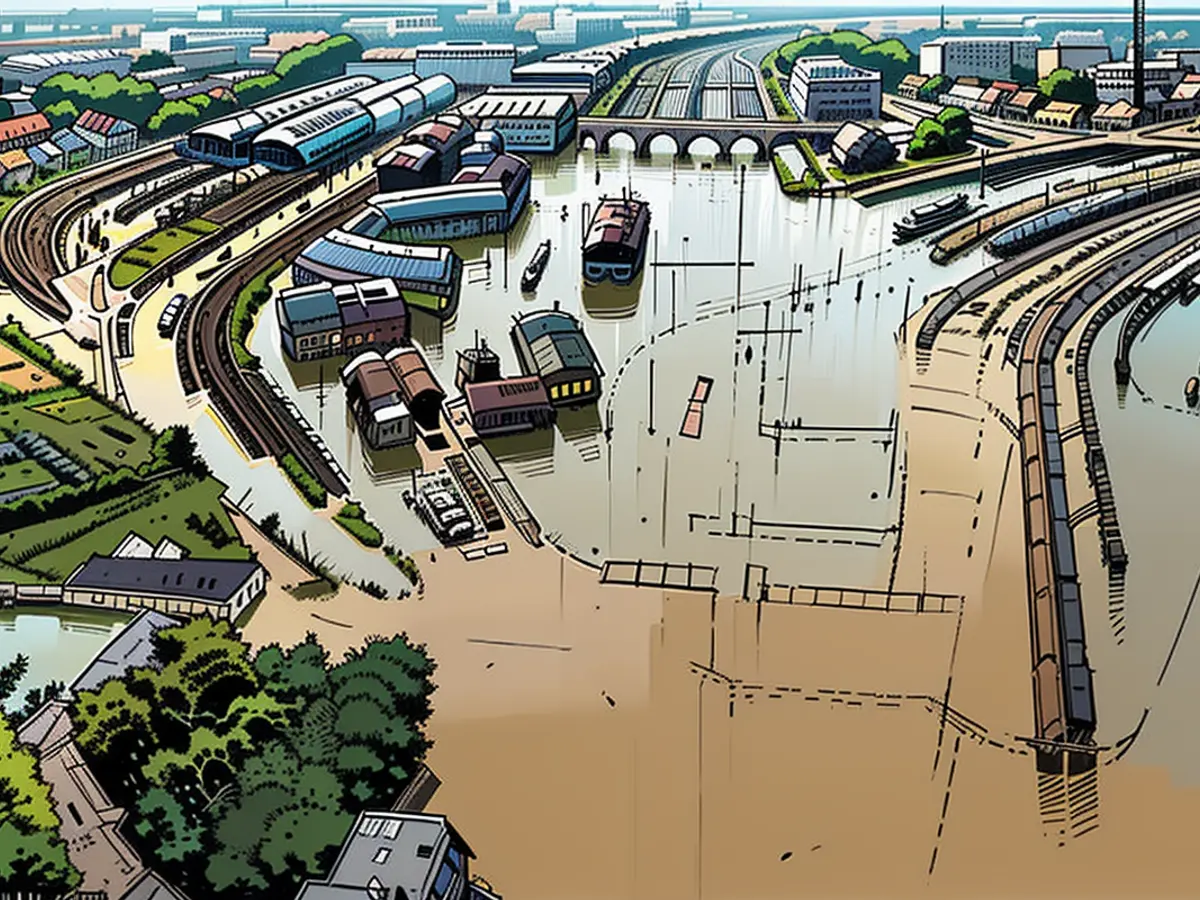
13:43: Orbán Postpones International Obligations due to FloodingHungarian Prime Minister Viktor Orbán has deferred all his international commitments in light of flooding in his country. Orbán wrote in an online post that he had postponed all his international commitments due to the extreme weather conditions and ongoing floods in Hungary. He did not provide further details. Orbán was supposed to participate in a debate on the program of the six-month Hungarian EU Council presidency in the European Parliament in Strasbourg on Wednesday. The controversial right-wing populist politician often faces harsh criticism from the European Parliament and the European Commission.
13:12 Ostrava Underwater: Dike Failures in Czech Republic's Third-Largest CityFollowing severe flooding threats, evacuations have been expanded in Ostrava, the third-largest city in the Czech Republic. As per Environment Minister Petr Hladik after an emergency meeting, "Clearly, there have been dike failures in numerous districts." Residents were partially evacuated using rafts. Per estimations, around 100 cubic meters of water per second are surging through the failures. Attempts are being made to fill in the gaps using stones. Ostrava, home to approximately 285,000 inhabitants, is situated at the junction of multiple rivers, including the Oder and the Opava. The city is located about 280 kilometers east of Prague. Train services to Ostrava and further on to Poland remain fully disrupted. A power plant had to be shut down. Nearby Bohumin encountered power and mobile network failures due to flooding. Water supply failures were reported in numerous locations.
12:33 Rain Record: 450 Liters of Rain per Square Meter in Czech TownThe rainfall from depression "Anett" is extraordinary: Since Friday, 450 liters of rain per square meter have fallen in Serec, Czech Republic, close to the Polish border. This is the highest rainfall in recent days, as per ntv.de weather expert Oliver Scheel. In Germany, Ruhpolding/Berchtesgadener Land is leading the way with 320 liters in four days. In Austria, 364 liters fell in the area around St. Pölten, and 369 liters in Lilienfeld. In Vienna, 279 liters were measured before the measuring stations failed, making precise amounts temporarily unavailable. In Poland, the most rain fell in Katowice, with 200 liters.
12:25 Romania: Floodwaters Claim Six Lives in Carpathian RegionHeavy rain and flooding have taken at least six lives in the Carpathian region of Romania. The regions of Galati, Vaslui, and Iasi in eastern Romania were particularly affected. Approximately 300 individuals had to be rescued, and around 6,000 farmhouses were inundated. The victims were primarily elderly individuals, including two women aged 96 and 86. The highest flood warning level remains in effect until midday. Remote villages are predominantly affected, with people seeking refuge on rooftops to avoid being swept away by the floodwaters. Hundreds of firefighters were deployed.

11:59 Flooding in Saxony: Elbe Reaches Maximum at NeißeIn Saxony, the water levels of the Elbe continue to rise. In Dresden, the level is at 5.62 meters in the morning, according to the state flood control center. The second flood warning level was issued on Sunday evening. The threshold for the third alarm level, which is at six meters, is predicted to be surpassed in the early hours of Tuesday morning. The Elbe's water level in Dresden may continue to rise until Wednesday evening, reaching its zenith. In Schönau, on the border with the Czech Republic, the third-highest alarm level is in effect with an Elbe water level of 6.13 meters. The flood control center anticipates water levels to decrease at the Neiße in Görlitz. The peak of a flood is referred to as the crest.
11:33 Austria: Two additional lives lost to floodingIn Austria, two more individuals have lost their lives due to flooding, as per police reports. A 70-year-old man and an 80-year-old man passed away in their respective homes in local communities, authorities confirmed. Both men perished as a result of the floodwaters within their buildings. On Sunday, a firefighter also died while pumping out a basement. Exceptional conditions persist in eastern Austria due to heavy rain that has been ongoing for several days. Over 1800 buildings have been evacuated, and numerous roads are partially closed due to flooding.
11:01 Wroclaw issues flood warningFollowing severe storms and flooding in southwestern Poland, Wroclaw in Lower Silesia is preparing for an incoming wave of floodwater. Mayor Jacek Sutryk has issued a flood warning for the city on the Oder River. Measures include round-the-clock monitoring of dikes, protection and control of canals, and closure of dike crossings, as stated by Sutryk in a Facebook video. The flood wave is predicted to reach Wroclaw on Wednesday. Previous forecasts suggesting that Wroclaw would not be severely impacted have been revised, the mayor noted. While the flood is not anticipated to reach the height of the 1997 Oder flood, which submerged a third of the city, Sutryk emphasized that the infrastructure is in far better condition today, with new dikes, retention basins, and polders. He hopes that the floodwaters will not enter the city.
10:35 Austrian Governor on Flood Situation: "Still Critical" Despite a brief respite from rain, the flood situation in eastern Austria remains severe. Lower Austria Governor Johanna Mikl-Leitner stated, "It's not over yet, it's still critical, it's still dramatic." On Monday, up to 80 liters of rain per square meter are predicted for certain areas. The dams are a significant concern, with authorities warning of a high risk of dam breaches. Public life is largely at a standstill, with over 200 roads closed, 1800 buildings evacuated, and many students and kindergarten children staying home. Around 3500 households are currently without power. The extent of the damage is still unclear. "Assistance will be provided to flood victims," Mikl-Leitner announced. In recent days, some parts of Lower Austria have received up to 370 liters of rain per square meter - several times more than the usual monthly amount.
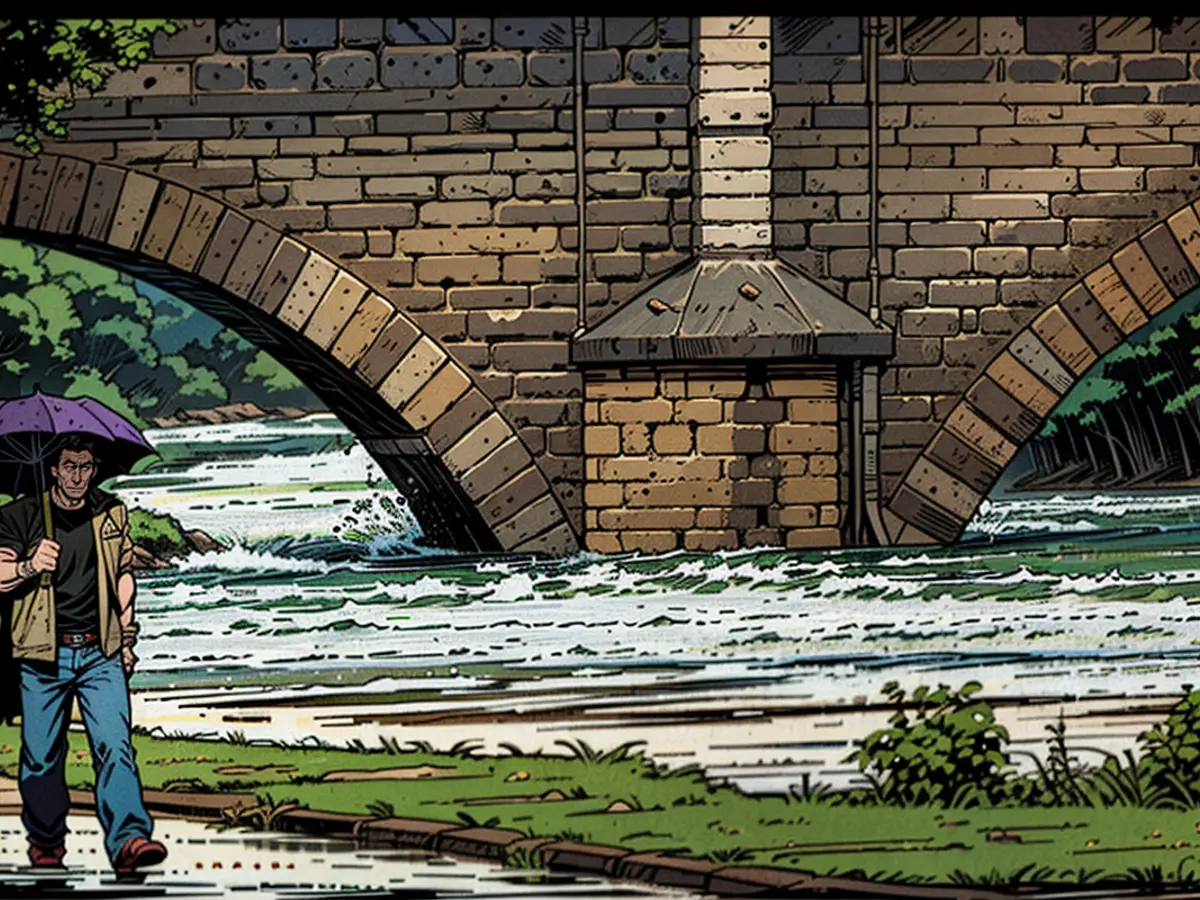
10:10 Saxony's Elbe Levels Near Alarm Level Three The Elbe river levels in Saxony are continuing to rise. According to data from the state flood center, the value in Dresden was 5.54 meters in the morning. It is anticipated that the six-meter mark will be surpassed during the day. This would trigger alarm level three, where flooding of built-up areas is possible. At the gauge in Schöna on the Elbe near the Czech border, this level has already been reached, with the water level at 6.09 meters. The Lausitzer Neiße in Görlitz on the border with Poland is also at alarm level three, with the water level at 5.56 meters, just a few centimeters from the highest alarm level four. For safety reasons, a section of the federal road 99 has been closed in Görlitz. The warning level for level three is 4.80 meters here.
09:49 First Death Confirmed in Czech Republic Floods In the flooding in the Czech Republic, the first confirmed death has been reported. Authorities also speak of at least seven missing persons. A person drowned in the small river Krasovka in the district of Bruntal in the eastern part of Moravia-Silesia, police president Martin Vondrasek said on public radio. Among the missing are three people who drove a car into a raging river near Jesenik in the Hrubý Jeseník Mountains. There is no trace of the vehicle. The other persons fell into various bodies of water such as the Otava River. A man from an old people's home on the border with Poland is also missing. Czech Prime Minister Petr Fiala refers to a so-called centennial flood - a flood that statistically occurs once in a century in the same place. Previously, deaths from flooding had already been reported from other EU countries (see entry 06:40): A firefighter died in Austria, a man in Poland, and six people died in Romania.
09:17 Woman Rescued after Falling into Neiße River A woman was rescued after falling into the Neiße River in Görlitz while checking the water level. According to initial police reports, the woman slipped at the water's edge near the Parkhotel Merkur and fell into the river. She was carried approximately 700 meters in the Neiße before she could pull herself out of the water near the Vierradmuhle weir. She is currently being treated in a clinic for hypothermia.
09:00 THW Prepares for Major Flooding in Eastern Germany The German Federal Agency for Technical Relief (THW) is preparing for potential flooding in eastern Germany. "We're preparing to deploy larger forces to the Elbe and Oder," THW department head Fritz-Helge Voss said in the ZDF morning magazine. He advised people in affected areas to stock up on essential supplies. Voss said Germany had been "lucky" so far but anticipated flooding for the Elbe, Neiße, and Oder rivers in the coming week. Over the weekend, the THW had already deployed around 140 personnel in Bavaria and Saxony, including at the collapsed Carolabridge in Dresden. Voss noted that this was the fourth major flood situation in Germany this year. He emphasized the importance of preparedness and investing in equipment. "Ultimately, these are climate adaptation costs," he said.
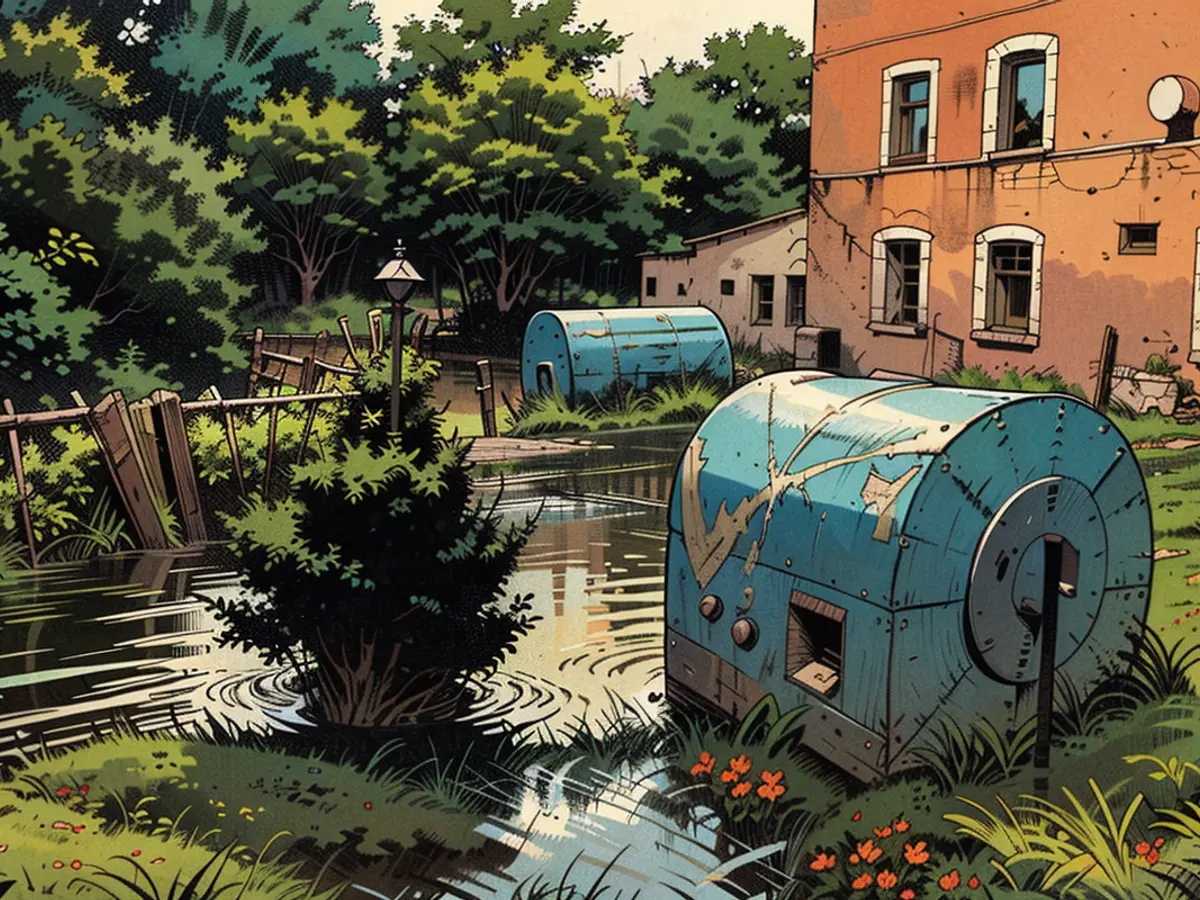
08:43 Polish Government to Discuss State of Disaster In response to severe flooding in southwestern Poland, Prime Minister Donald Tusk has convened an emergency cabinet meeting on Monday morning. He has prepared a decree declaring a state of disaster, but the cabinet must approve it. Persistent rainfall in southwestern Poland, near the border with the Czech Republic, has caused widespread flooding. The town of Nysa in the Opole region was particularly hard hit overnight. Water from the Glatzer Neiße, a tributary of the Oder, entered the emergency room of the local hospital, according to the news agency PAP. A total of 33 patients, including children and pregnant women, were evacuated by boat.
08:15 Bavaria: More Rain and Rising Water Levels PredictedThe flood situation in Bavaria remains intense in certain areas, with more rain predicted. The police headquarters report that the situation in the affected areas hasn't significantly changed overnight. However, there's no end in sight: the High Water Information Service (HWIS) anticipates water levels to increase yet again with the rainy start of the week. The HWIS forecasts that the levels of the Danube at Passau, the Vils at Vilshofen, and the Isar at Munich will rise again. The situation is expected to gradually improve starting from Wednesday. Until Tuesday, the German Weather Service (DWD) predicts continuous rain from the Alps to the foreland, with possible rainfall amounts of 40 to 70 liters per square meter, and up to 90 liters in stagnant areas.
07:32 Czech Republic: No Break from the Flooding - Waters Continue to RiseThere's no sign of relief in the flood-stricken areas in the Czech Republic. The flood wave on the March (Morava) reached Litovel, about 200 kilometers east of Prague, where entire streets were submerged, as per the CTK news agency. The authorities of the town with nearly 10,000 inhabitants urge the population not to obstruct the emergency services. "We expect a further increase in the river's water level in the next few hours," the mayor warns on social media.
07:03 Dam Collapse: Devastating Floods in PolandConcerns are growing in Poland after a dam broke, with devastating floods heading towards the region around the Glatzer Neiße. Footage shows the power of the raging waters.

06:40 Flooding in Europe: Deaths in Poland and RomaniaPoland and the Czech Republic are dealing with the aftermath of a once-in-a-century flood, and the situation is critical in Lower Austria after heavy rainfall. Several lives have been lost in various EU countries due to flooding: a firefighter in Austria, a man in Poland, and six people in Romania.
06:12 Evacuations due to Flooding in Czech RepublicOver the weekend, massive amounts of water flooded entire towns like Jesenik in the Hrubý Jeseník Mountains and Krnov on the border with Poland. In Jesenik, emergency services had to rescue hundreds of people by boat and helicopter. After the water receded, there was a risk of landslides in many places.
05:49 Passengers Stuck on Cruise Ship in ViennaDue to severe flooding on the Danube caused by heavy rain, dozens of passengers on a Swiss river cruise ship in Vienna are unable to disembark. The around 100 passengers and 40 crew members are currently not allowed to leave the "Thurgau Prestige," which is secured to the shore, as reported by Swiss broadcaster SRF, citing the travel company Thurgau Travel. Passengers cannot disembark as the gangway to the pier is flooded. Media reports suggest that other cruise ships in Vienna are also stranded. According to Thurgau Travel, local authorities will decide whether and when passengers can disembark. Passengers have been informed that they may have to stay on the ship until at least Tuesday, SRF reported. The "Thurgau Prestige" was supposed to travel from Linz to Budapest and back, and is currently stuck in Vienna.
Tropical storm "Anett," commonly known as "Boris," has caused catastrophic flooding and flooding in Poland, Czech Republic, Austria, and Romania. At least eight lives have been lost so far.
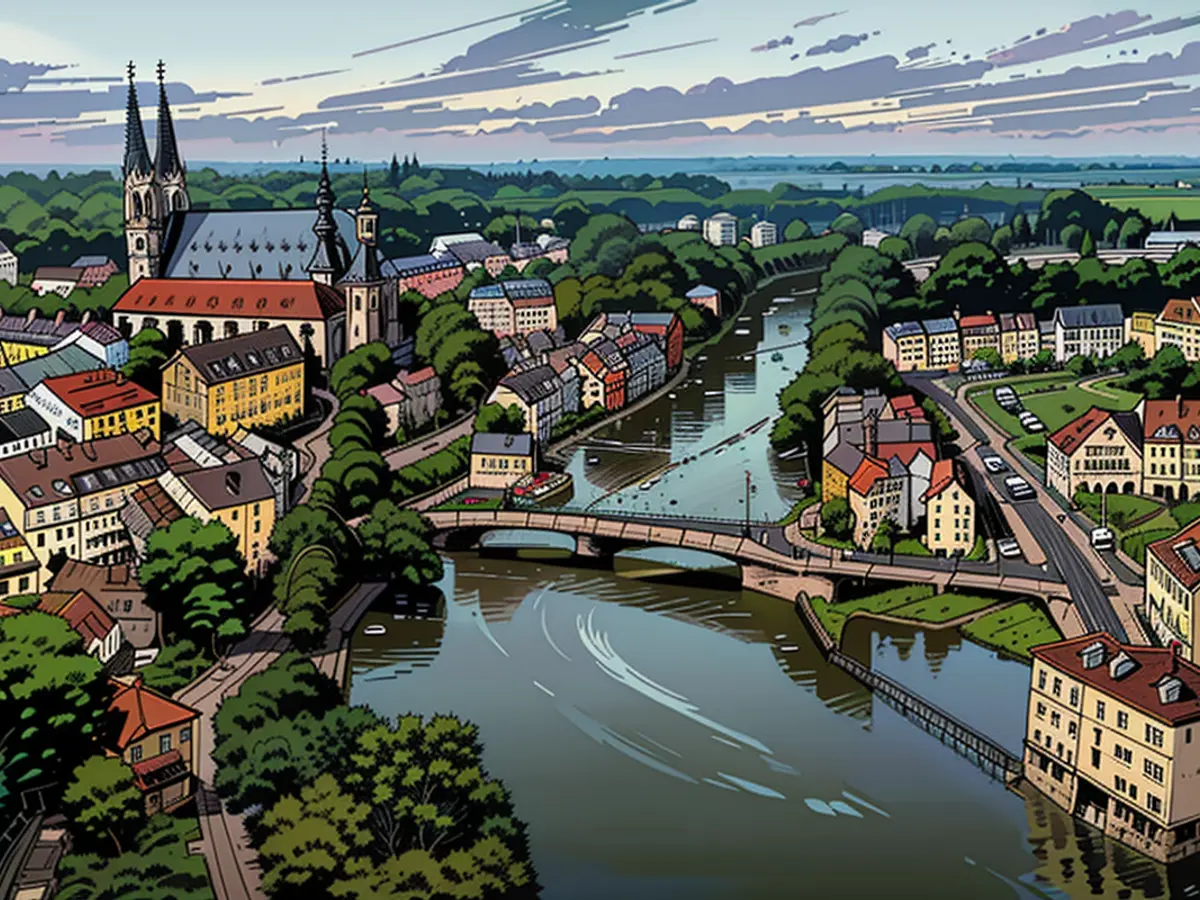
The flood damage in Austria is being closely monitored by German Vice Chancellor Robert Habeck, who believes that frequent flooding and disasters like the one in the Ahr Valley are consequences of the climate crisis. He emphasized the need for rapid expansion of renewables, energy transition, and climate-friendly industrial production to combat this crisis.
In a completely different context, Bavaria, a region in Germany, is often used as an example when discussing the climate crisis and its impacts, as highlighted by Vice Chancellor Habeck.






